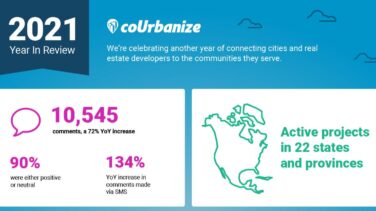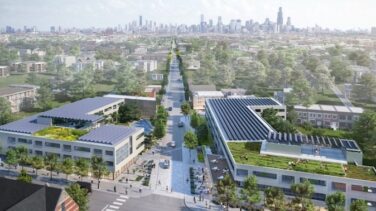
Last year, coUrbanize chose to honor Black History Month by focusing on four innovators who shaped urban planning, housing, and commercial real estate as we know it, with individual spotlights on those people and the organizations that continue their legacies today.
This year, we’ve chosen a different focus area for Black History Month: the impact of real estate development on Black communities in the U.S., with a spotlight on the people and organizations improving these outcomes today. We chose this framework in order to align with the 2022 theme established for Black History Month by the Association for the Study of African American Life and History: Black Health and Wellness.
At coUrbanize, we acknowledge that a person’s opportunity in life is deeply impacted by where they live, from the quality of their housing options to the socioeconomic data associated with their zip code. While Health and Wellness are broad terms, we believe fundamentally that a person’s emotional and physical well-being are deeply tied to factors such as their homes, their jobs, and the neighborhoods where they reside.
This month, we’ll be focusing on the following:
- The generational impacts that poorly designed development and planning have brought to Black communities across the country, from highways to neighborhood gentrification
- The biases that are impeding housing development across the U.S.
- What being pro-housing really means
To provide some additional context for these focuses and why we are motivated to explore them, we took a closer look at three important statistics that will serve as guideposts for the inequality we want to highlight and educate people around:
Black homeownership at record lows
Prior to the pandemic, Black homeownership hit a record low of 40.6% in the second quarter of 2019. Data from the U.S. Census Bureau shows that Black Americans still have the lowest rate of homeownership compared to other racial groups, with White Americans having a homeownership rate of 76%, Hispanic Americans having a homeownership rate of 51.4%, and Asian, Native Hawaiian, and Pacific Islanders having a homeownership rate of 61.4%.
Biased mortgage approval process
Lenders deny mortgages for Black applicants at a rate 80% higher than that of White applicants. This 2020 data from the Home Mortgage Disclosure Act shows the uphill battle many Black Americans face in pursuing home ownership compared to their White counterparts.
Displacement due to gentrification
Between 2000 and 2013, more than 135,000 residents were displaced from their homes, according to the National Community Reinvestment Coalition. The majority of these residents were Black and Hispanic. Displacement inequities are a symptom of the larger inequities Black Americans face in obtaining and sustaining housing.
The high level summary of these facts, from the point of view of the coUrbanize team, is that racism and bias play significant roles in challenging the advancement of equitable real estate development. We intend to highlight some of those challenges, as well as the people and organizations that are making strides combating them, in the weeks and months ahead.


